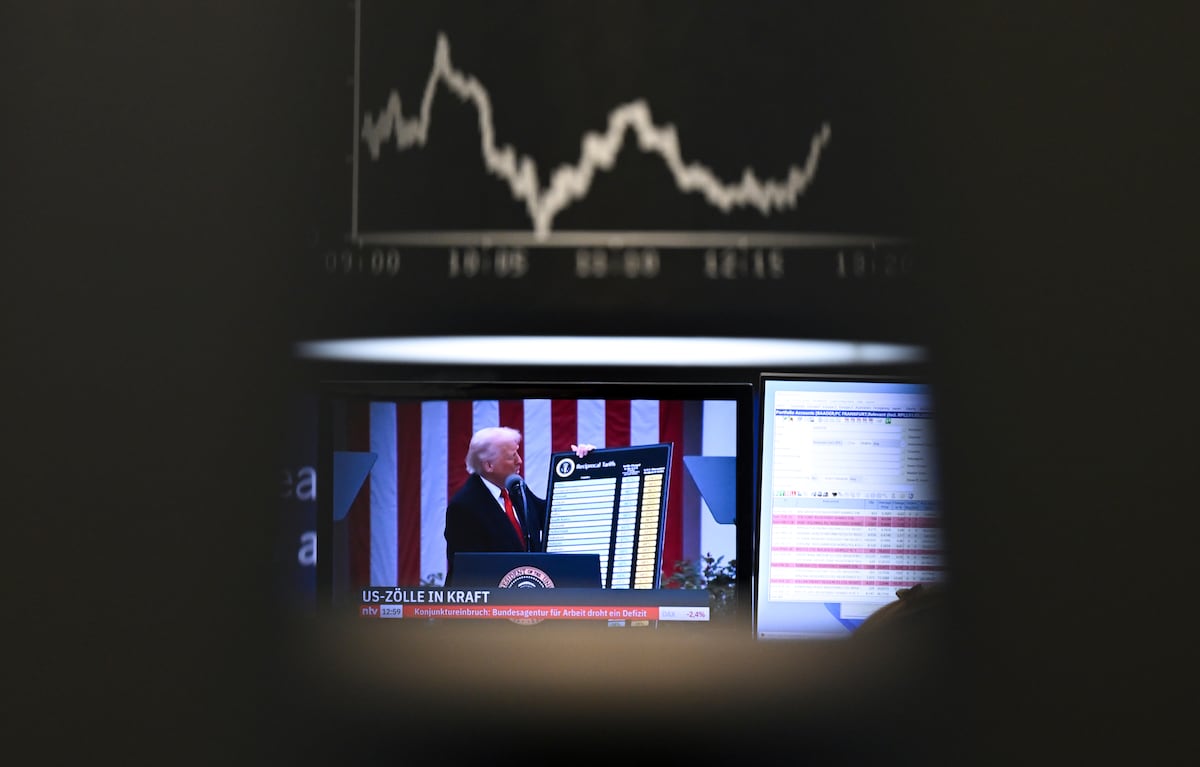California Governor Gavin Newsom said he has directed his administration to “look at new opportunities to expand trade” as he tries to steer his state around President Donald Trump’s sprawling import tariffs.
Why It Matters
California, the world’s fifth-largest economy, plays a crucial role in driving U.S. economic growth. As the largest importer and second-largest exporter among U.S. states, with over $675 billion in two-way trade, it holds significant economic influence. Therefore, Trump’s tariffs could have a major impact, potentially increasing costs for California businesses, disrupting global supply chains, and putting pressure on vital industries within the state.
What To Know
In a post on X, Newsom addressed the U.S.’s global trading partners, writing “California is here and ready to talk.”
It comes after a Fox News report revealed that Newsom is directing his state to pursue “strategic” relationships with countries announcing retaliatory tariffs against the U.S., urging them to exclude California-made products from those taxes.
Damian Dovarganes/AP
In response, White House spokesperson Kush Desai told Fox News: “Gavin Newsom should focus on out-of-control homelessness, crime, regulations, and unaffordability in California instead of trying his hand at international dealmaking.”
On Wednesday, the White House imposed a 10 percent baseline tariff on all imports, including those from U.S. allies and non-economically active regions, along with higher rates for countries with large trade surpluses against the U.S. on Wednesday.
The tariffs include a 34 percent tax on imports from China, a 20 percent tax on imports from the European Union, 25 percent on South Korea, 24 percent on Japan and 32 percent on Taiwan. Mexico and Canada, from which most U.S. produce imports come, are exempt from Trump’s latest tariffs, but the 25 percent tariffs that Trump levied on both countries last month will remain intact.
Trump’s announcement sent the markets into turmoil on Thursday, with Wall Street recording its worst day since 2020, when Covid-19 was in full swing. Meanwhile, China hit back with a 34 percent retaliatory tariff on Friday, in the first signs of an all-out trade war that could cripple imports and exports. Other nations are now also mulling over retaliatory tariffs.
Amid the turmoil, the Newsom administration is concerned that retaliatory tariffs could hit California hard, with major impacts on agriculture, manufacturing, and trade
California, not being its own country, can’t be directly targeted in international trade retaliation. However, countries could choose to retaliate against Trump’s tariffs by targeting goods commonly produced in states other than California—like soybeans or pork—instead of products like California wine or walnuts, Daniel Sumner, an agricultural and resource economics professor at UC Davis, told Newsweek.
According to Fox News, Newsom administration officials are particularly concerned that California’s almond industry, a key agricultural exporter, could lose billions of dollars, as countries like China, India, and the European Union impose retaliatory tariffs.
Almond exports were valued at $4.7 billion in 2022, supporting 110,000 jobs and contributing $9.2 billion to California’s GDP. With 76 percent of the world’s almonds grown in California—and most exported—trade restrictions could cost the industry up to $875 million, according to a UC Davis study.
Other food prices may also rise as a result of the tariffs. Ninety percent of avocados consumed in the U.S. come from Mexico, so restrictions could drive up prices and reduce consumption. Similarly, California milk prices could increase if tariffs make canola from Canada more expensive, forcing farmers to switch to pricier alternatives.
The wine and alcohol industries face rising costs as well. Tariffs on European wines may lead California winemakers to hike prices, while reliance on imported materials like corks, glass, and capsules from Mexico and Canada could further push prices upward.
Beyond agriculture, the state’s manufacturing sector—especially in Los Angeles—is at risk. The region employed over 313,000 manufacturing workers last year and plays a central role in California’s $1 trillion county economy. Economist Jock O’Connell warned that reduced imports and exports could lead to fewer jobs at ports and throughout supply chains, especially in the Inland Empire.
In 2023, California exported nearly $160 billion in manufactured goods, led by $47.9 billion in computer and electronic products, along with $18.4 billion in machinery and $16.2 billion in chemicals. These sectors could also face retaliatory tariffs from trade partners, further threatening the state’s economy.
State officials also expressed concern that retaliatory tariffs will cause significant disruptions to supply chains between California and Baja, arguing that taxing goods each time they cross the border will raise final product prices, ultimately impacting Californians.
Meanwhile, a Newsom official also told Fox News that the new Trump tariffs will hinder access to essential supplies, like construction materials, needed to rebuild after the Los Angeles wildfires. The U.S. currently imposes a 14 percent duty on Canadian lumber, with the rate possibly rising to nearly 27 percent this year.
But Sumner is doubtful that Newsom’s directive will go anywhere toward helping the state.
“The standard theory about retaliation lists is to hurt the offending government politically. That would already suggest going after products from places that supported President Trump. Back when the Democrats had power it was natural to hit California wine because Speaker Pelosi and other Californians had power. That is much less true now,” he told Newsweek. “Overall, it is hard to see much coming from this.”
Analysis by the Yale Budget Lab found that the Trump Administration’s announced tariffs are expected to drive up overall inflation by 2.3 percent this year alone. This includes a projected 2.8 percent increase in food prices and an 8.4 percent jump in automotive prices—resulting in an estimated $3,800 hit to the average American household.
What People Are Saying
Gavin Newsom said in video posted to X: “Donald Trump’s tariffs do not represent all Americans, and on behalf of 40 million Americans that live in the great state of California , the tentpole of the US economy, 14% of US GDP, the fifth largest economy in the world, the dominant manufacturing state in America. Our state of mind is around supporting stable trading relationships around the globe. And that’s why today I’ve directed my administration to look at new opportunities to expand trade and to remind our trading partners around the globe that California remains a stable partner.”
In a press release, he added: “California leads the nation as the #1 state for agriculture and manufacturing — and it’s our workers, families, and farmers who stand to lose the most from this Trump tax hike and trade war. To our international partners: As the fifth largest economy in the world, the Golden State will remain a steady, reliable partner for generations to come, no matter the turbulence coming out of Washington. California is not Washington, D.C.”
Daniel Sumner, an agricultural and resource economics professor at UC Davis, told Newsweek: “California is not a separate country so there would not be California as a country of origin. However, an importer could retaliate against specific goods that tend to come from states other than California. For example, Japan could avoid listing wine, walnuts, or tomato paste, but instead make a point of going after soybeans and pork instead. For manufactured goods, it is harder to tell if it is a California product or has substantial content.
“The standard theory about retaliation lists is to hurt the offending government politically. That would already suggest going after products from places that supported President Trump. Back when the Democrats had power it was natural to hit California wine because Speaker Pelosi and other Californians had power. That is much less true now.
“The other response to Governor Newsome may well be from federal agencies that decide to close California offices or cancel programs that benefit California. That may have a bigger economic impact than the import policy responses.
“Overall, it is hard to see much coming from this.”
Donald Trump said on Thursday: “The markets are going to boom. The stock is going to boom, the country is going to boom, and the rest of the world wants to see is there any way they can make a deal.
“This is one of the most important days, in my opinion, in American history. It’s our declaration of economic independence. For years, hardworking American citizens were forced to sit on the sidelines as other nations got rich and powerful, much of it at our expense,” Trump said. “But now it’s our turn to prosper, and in so doing, use trillions and trillions of dollars to reduce our taxes and pay down our national debt, and it’ll all happen very quickly.”
What Happens Next
Trump’s tariffs are set to go into effect between April 5 and April 9. The administration expects the new rates to remain in place until the U.S. narrows a $1.2 trillion trade imbalance recorded last year.
Update 4/5/2025, 6:05 a.m. ET: This article has been updated with comment from Daniel Sumner.
















